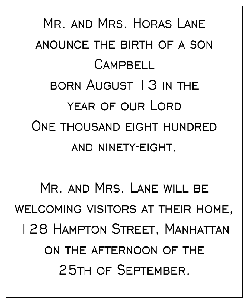
Chapter 9 in The Complete Beginner's Guide to Genealogy, the Internet, and Your Genealogy Computer Program next covered vital records. You were also asked to read Chapter 12 "Vital Records," in Val Greenwood's Researcher's Guide to American Genealogy. Greenwood's chapter explains the early history of Vital Records in America. Understanding the origin of records will help you become a better researcher because you will know when areas first started keeping records, if they were archived, and if they are available today.
Due to 9/11, some people have been frightened into thinking that closure of all vital records could stop terrorism in the United States. Others argue that it was those countries who closed their vital records to their citizens that took away the liberties of the people and forced tyranny upon them. Why should government know all about its people, and not citizens? Congress is (in October/November 2004) voting on whether to close the birth, marriage and death records across America. This will be a very difficult blow for those just starting to work on their family history because these records are so important to proving relationships.
One of the key items you should have gleaned from this reading is the order in which vital records should be obtained. The last event in a person's life (death records) should be obtained first. This is because clues to those events which preceded death will be found in the death certificate. Next look at marriage records, and then birth records. By going after the later events first, you will save time and expenses. You have more information to base your evaluation and further research hypothesis upon after looking at the later records.
Case studies and further support of vital records is provided on The Great Ancestral Hunt, CD. Lesson 2 covers vital records in greater detail as well. Click here to go to the lesson on the Internet or go to your CD, lesson 2.
Think about your own family. Is there someone who you should order a vital record (birth, marriage, or death) about so that you might know their parents? Write down this information as an item on your Research Planner.
|